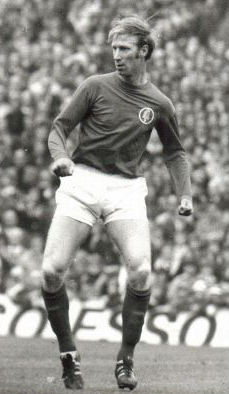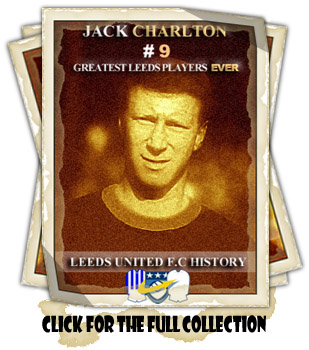

Charlton John (Jack)
1952-1973
(Player Details)
Centre Half
Born: Ashington: 08-05-1935
Debut v Doncaster Rovers (h): 25-04-1953
6’11/2” 12st 13lb
#9 in 100 Greatest LUFC Players Ever

“Big Jack” was part of the Elland Road scene for twenty-one years. A native of Ashington,
he attended Hurst Park Modern School, represented East Northumberland Schools and played
for Ashington YMCA and Ashington Welfare before joining Leeds as an amateur in 1950, turning
professional in May 1952. His uncles George, Jim and Jack all starred for United and it was
Jim who recommended the gangling Jack Charlton to Leeds. After National Service in the
Royal Horse Guards, he occupied the Centre Half spot vacated by John Charles, who had switched
to the attack. In October 1957 he played for the Football League against the League of
Ireland. International honours seemed likely, but his career reached a plateau as he found
himself in a struggling United team. The appointment of Don Revie was the catalyst for change
in the fortunes of the big stopper. As a player who had just arrived at Elland Road, Revie
questioned Charlton's tactical awareness and in particular his tendency to make long,
sometimes fruitless, forays in attack and then struggle to get back to his defensive duties.
Revie made it plain that he would not allow that if he was Manager. So no doubt Charlton
would have had a few misgivings when Revie was appointed Manager soon afterwards. Revie
pandered to Charlton's attacking instincts by playing him at centre-forward on a few
occasions but despite scoring several goals in that capacity, it brought home to Charlton
just where his strengths lay. He was picked for an F.A. XI against the British Army at Roker
Park, Sunderland on 18th October 1961, which gave Charlton encouragement. Revie for his part
bult his defence around the tall Geordie and gave him free rein over organizing Gary Sprake,
Paul Reaney, Willie Bell and Norman Hunter into the most formidable defence in Britain. After
the injury to inspirational captain, Bobby Collins, he had a brief spell as Captain but gave
it up because of his superstition of coming on to the pitch last. With Norman Hunter alongside,
Charlton, a supreme header of the ball and excellent tackler, developed into the best Centre
Half in England. He won a belated first cap in 1965 against Scotland when his brother Bobby,
a household name with Manchester United, was in the side. The brothers played vital roles in
England’s 1966 World Cup success and Jack won thirty-five full caps and scored six goals, as
well as representing the Rest of the United Kingdom against Wales, along with two other Leeds
players, Billy Bremner and Terry Cooper, in a game to celebrate the investiture of the Prince
of Wales on 28th July 1969. He also represented the Football League, scoring twice in six games,
and appeared in an unofficial International against a Mexico XI in Guadalajara on 4th June 1969
in the run up to the preparations for the 1970 Mexico World Cup and two games for England "B"
in four days from 20th May 1970, when he played against Columbia in Bogata and against the
Ecaudor team Liga Deportiva Universidad in Quito, just before that World Cup. He was Player of
the Year in 1967. He figured in United’s early successes under Revie, winning two Inter-City
Fairs winners' medals in 1967-68 and 1970-71, the League Cup in 1967-68, the League Championship
in 1968-69 and won an F.A. Cup Winner’s medal in 1971-72, two days before his thirty-seventh
birthday. He played his final match for Leeds United in a 1-3 defeat by Southampton at Elland
Road on 28th April 1973. It was his six hundred and twenty-eighth League match and his Seven
hundred and seventy-second game of his Leeds career. Both are club records. The following year
he became Manager of Middlesbrough and was named Manager of the Year in his first season as
Middlesbrough swept to the Second Division title in 1973-74 by a record points margin. He stayed
at Ayresome Park for four years before leaving on 21st April 1977. He then applied for the
position of England Manager, after Don Revie had left, but was not even interviewed, possibly
due to his close association with Don Revie over the years. In October 1977 he took over as
Manager of Sheffield Wednesday and revived their flagging fortunes before quitting after six
years in the position in May 1983. He then rejoined Middlesbrough for a couple of months in
early 1984 but soon left when his mother's cousin, Jackie Milburn, asked him to take over at
Newcastle United in June 84. He left Tyneside in August 1985 after keeping the club up and
signing Paul Gascoigne, but a bit of acromony from the disgruntled fans. It seemed that after
a bright start to his Managerial career with Middlesbrough, his natural contrariness had seen
him quit four clubs in eight years and it seemed as if his League Management career was over.
After thirty-five years in football and twelve in club management, Jack Charlton spent the
autumn of 1985 in his favourite pursuits of hunting, shooting and fishing and generally
enjoying life. Then in December 1985 Des Casey, President of the Football Association of
Ireland, rang out of the blue to take him on. The first Englishman to hold the post, he steered
them to the European Championship Finals in 1988, where his side pulled off a famous victory
over England. Charlton finished runner-up in World Soccer Magazine’s Manager of the Year poll.
To prove that rare Irish victory was no fluke, in 1990 he led the Republic to the World Cup
Finals for the first time. They reached the quarter finals before losing to the hosts, Italy.
Such deeds earned Jack the freedom of Dublin. He retired in January 1996 after the Irish just
failed to qualify for that year’s European Championships in England. Jack was inducted into
the English Hall of Fame in 2005 and is a TV Pundit and after-dinner speaker. In addition to
being given the freedom of Dublin, Jack received an OBE, honorary Irish citizenship and is a
Deputy Lieutenant of Northumberland.